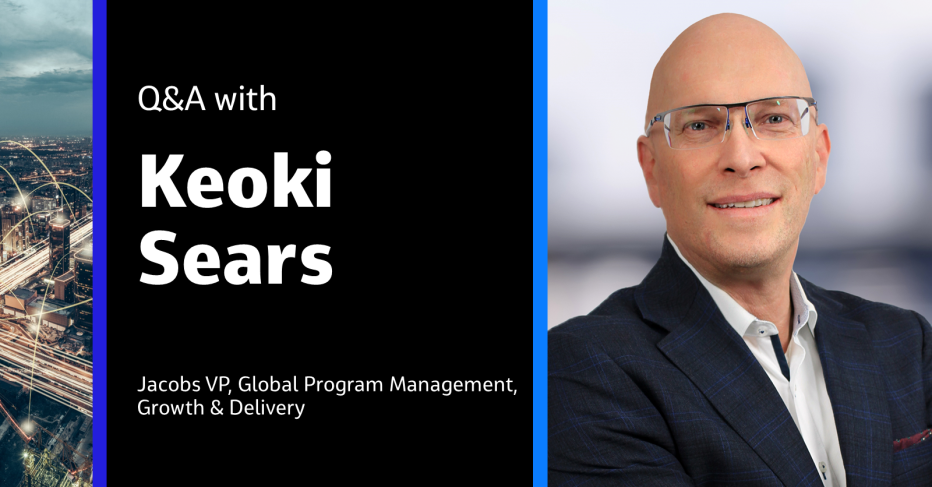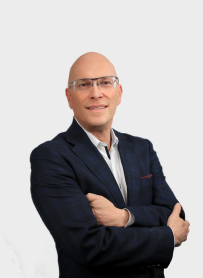
Delivering a program today requires lessons from the past and a keen eye toward the future.
Keoki Sears shares his insights from 30 years of multi-billion-dollar program management and leadership. He describes how our track record in teamwork, innovation and talent empowerment delivers more than just a program.
How are you solving your client’s biggest challenges?
It starts with our strategy, purpose and values, defining who we are and what we want to be. The growth accelerators Jacobs has committed to are the mechanisms that help guide us in the sectors we serve and reflect current global conditions. Our growth accelerators cut across the entire organization, creating connections between the global market trends, our solutions and company purpose. I believe program management is the most powerful vehicle for delivering our strategy. For example, programs allow us to rethink climate resiliency through several projects and programs for the global energy transition, which offer fantastic opportunities for our clients and Jacobs to keep playing a significant role in the climate response.
In the programs we deliver, we harness data solutions to help our clients operate more efficiently and unlock better outcomes. It's where we use data and tech-driven insights to make better decisions, digitize more assets, empower more reliable and accurate long-term planning, and better operate the infrastructure of the future.
Lastly, we're increasingly experiencing incredible opportunities to get involved earlier in program conceptualization and strategy at the source. In some cases, even before clients have conceived of the need for a more comprehensive program. Through our consulting and advisory services, we're helping clients define their challenges and the solutions they need. I call it good program management practice.
Through my role in growth and delivery, I’m excited about the opportunity to showcase our capabilities, network our team and deliver instrumental programs for our clients. I want to ensure that program management continues to be a model in which we excel and adopt and transfer lessons from one program to another. I look forward to bringing the very best Jacobs has to offer, our people, our talent and our systems and tools to every one of these pursuits and programs so that we’re addressing our client’s challenges head on and supporting our communities.
What are the key insights from your program management experience?
Program management is the single most powerful opportunity for us to serve our communities, reshape cities and improve our world at scale. Programs are a potent tool in preparing the world for the challenges we face today and creating a legacy for tomorrow.
Case in point: the London 2012 Olympic and Paralympic Games was an iconic program. Since the 1700s, the east side of London around Stratford was what we would characterize in the U.S. as a Superfund site, as it was highly polluted and a non-developable platform. Only through our work with the Olympic Delivery Authority was it changed into one of London's loveliest parks and fastest developing communities. London 2012 had the most incredible team I've ever worked with, and while we faced daunting challenges, our well-crafted, highly motivated team pulled together and got things done. I learned several important lessons there, including one crucial one: never lose sight of an ambitious vision and your team's higher mission. In this instance, we wanted to help change the face of East London and there was no better opportunity than through sport.
This impact went even further: we changed how we delivered program management in the U.K. and Europe. We moved from a historically adversarial model to a more collaborative delivery partner approach. This ramped-up collaboration and stakeholder integration empowered us to achieve never-seen-before results.
Another lesson London 2012 taught me was about taking the time to dream. I've never seen it done quite like we did. In 2007, in collaboration with the Olympic Delivery Authority, we started enabling works and building underground power lines, but the rest of the team spent the year envisaging and planning. It was a mentality of starting slow, building a strategic foundation and increasing momentum and efficiency for rapid and purposeful results. We told ourselves that in 2008, after the Beijing Olympics, we would ramp up to full speed and build faster, better and safer than any other Olympics.
The results: beyond all the positive feedback and community legacy created, we ended up a billion pounds under budget and finished all the venues a year before the opening ceremony. That has never happened in any previous Olympics or since. I also think it's the best example of being able to help and support the underserved dramatically. Now, people go out and have picnics in Olympic Park, use all the facilities and walk any time of day or night. It's a place I visit every time I'm in London. I rent a bike and cycle through it because it's a tremendous asset to the city. Jacobs was an integral part of the program team that helped reshape a crucial part of one of the world's most important cities and helped lift and serve its communities.
I also worked on - SuedLink, a 720-kilometer (~43 mile) long high-voltage direct current (HVDC) underground power cable. It's a large-scale program with plenty of moving parts and long-term benefits, but here's what it really is: supporting the conversion to 100% renewable energy by 2040 in Germany. It's arguably the bravest, boldest energy transition effort globally, and our teams are helping achieve that.
Finally, our work at the National Western Center, where we are transforming a historic livestock market into a year-round destination for agriculture, education and entertainment. This program is an excellent example of building forward rather than just rebuilding. We had an opportunity to rethink the campus and surrounding community. We revitalized the riverfront and worked with the local university to develop a research and development partnership, providing thought leadership around farming, ranching and conservation. We also worked to create workforce development programs and are exploring a neighborhood co-ownership model so that they can participate in the partial ownership of infrastructure of revenue-earning infrastructure on the campus, creating life-changing opportunities for generations.
As all these programs show, success in program management relies on partnering with clients to tackle immense, highly ambitious challenges to unlock wide-ranging benefits beyond commercial gain, including social value and climate response. Passion and teamwork are at the heart of this success. Building a diverse team with unity of purpose, open communications and a well-thought-through plan can combine individual strengths to deliver extraordinary results. My passion is creating and leading these teams, harnessing industry-leading innovation and creativity to solve problems and accomplish great things for our clients and communities.
What are the key trends influencing program management delivery in the future?
Our clients expect more of us and want more from their programs, so we must continually raise our game and adapt to changing needs. One of the most important lessons is that we need to see all programs as opportunities to serve the local communities, help put the workforce back to work and train them to improve standards and future-proof growth. Achieving this requires us to follow these key trends:
- Implementing sustainable materials and methods, including a circular economy mindset.
Any program schedule constantly changes, uncovering and testing new methods of working and collaborating. Sustainability is a crucial measure of success for any major program.
- Harnessing data and intelligent controls more widely.
Technology is evolving by the minute, with it, the potential for greater use in our programs. We can identify trends more effectively and have more accurate predictions from the data we collect.
- Following the lessons we’ve learned using the latest construction methods.
Automation, modularization and other cutting-edge methods are becoming a standard in our programs. All the methodologies and learnings we’re making are creating best practices for the construction industry of the future and a broader array of solutions for our clients worldwide.
- Going beyond the asset to deliver a true legacy.
Consider these significant capital investments and how we can benefit the community beyond the program—uplifting our workforce and bringing sustainability into our approaches. Programs have a unique ability to draw together all their various projects and create cross-cutting themes, and through that, we can accomplish things we never thought possible.
In summary, our clients expect us to be faster and deliver with greater certainty. To achieve that, we all need to harness technology and talent in new ways, integrate more effectively with all stakeholders, including those in the community and keep learning from our projects and the industry.
How does Jacobs’ team culture differ from its competitors?
I think Jacobs gives us all superpowers. The significant diversity in this company, the depth of technical expertise, the scale, the dreams and aspirations and our company’s vision allow us to do things that I know I could never do on my own or, frankly, with any other company.
About the interviewee

Keoki Sears has more than 30 years’ experience managing the delivery of high-profile, multi-billion-dollar programs in the United States, Europe, Asia and the Middle East including the London 2012 and Rio 2016 Olympics and the 2022 FIFA World Cup Qatar. Keoki has worked in the heavy civil, utilities, industrial, telecommunications, environmental and transportation sectors for both client organizations and construction contractors. His focus is on structuring programs for long-term success through comprehensive planning, engineering, preparation and leadership. He has also helped develop many of the program management systems and tools deployed across our programs.
Keoki has an undergraduate degree in civil engineering from Virginia Tech and a master's degree in construction engineering and management from Stanford University. He has published two industry-leading textbooks on project and construction management.
You might be interested in...
Join #OurJacobs team
What drives you drives us as we work to build a better world – together. At Jacobs, every day is an opportunity to make the world better, more connected, more sustainable. We’re always looking for dynamic and engaged people to join our team. Bring your passion, your ingenuity and your vision.












































